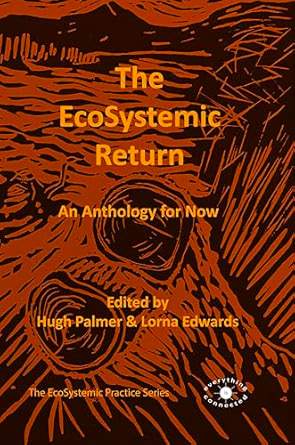The EcoSystemic Return: An Anthology for Now

Book Details
- Publisher : Everything is Connected Press
- Published : 2025
- Cover : Paperback
- Pages : 335
- Category :
Family, Couple and Systemic Therapy - Catalogue No : 98181
- ISBN 13 : 9781739773342
- ISBN 10 : 1739773349
Reviews and Endorsements
Perhaps it could never be overestimated just how critically important it is to address what each of the papers of this volume say in their own way: that we are not alone; that the problems humans face as a species owe their stubbornness to the idea that we are ontologically separate from ecologies and each other; and, that the challenge of our times is to think alongside and within a world of thick, dense, material relations - instead of above it. This book shimmers with the brilliance of a stunning ecological cosmovision that simultaneously decenters the human self while rethinking the world of things as profuse with a stranger vitality than we could ever have anticipated.
Professor Bayo Akomolafe, The Aspen Institute & Schumacher Center
This is a spine-tingling collection of papers, edging the reader out of their comfort zones, decentring the human and putting the eco back into systemic. It is exciting, disquieting, challenging reading, reading that presses for action. The action that is required for changing the future of systemic practice, and ultimately our world.
Dr Karen Partridge, Consultant Systemic Psychotherapist and Clinical Psychologist, Institute of Family Therapy, London
The eco-systemic return is an inevitable step in the co-evolution of systemic thinking and practice, embedded in today's turbulent world. Based on Bateson's and Guattari's, concept of three ecologies, we consider human subjectivity, social relations and the environment as entangled, mutual dependent, co-producing life. Research shows how green environments contribute to mental health. This rich book invites readers to observe systems as multi-actor-networks with intra-acting human and non-human actors, living together, differently. A must read for committed systemic practitioners.
Dr Robert van Hennik, The Lorentzhuis, The Netherlands
In our journey as Asian Muslim systemic family practitioners, deeply entwined in the intricate web of interconnected relationships, The EcoSystemic Return emerges as a beacon, offering a profound, timely reminder and contribution to the ever-evolving landscape of systemic therapy. Tracey A. Laszloffy's preface strikes a chord with the essence of our own expedition into family therapy, where systems theory became the guiding light of our practice. The book boldly confronts the urgent challenges of climate change and the erosion of local knowledge, seamlessly weaving them into the fabric of systemic thinking. The inclusion of Indigenous knowledge, emphasizing nature, wholeness, and circularity, seamlessly aligns with the holistic worldview inherent in many Asian cultures. This not only enriches therapeutic practices but also pays homage to the diverse wisdom embedded in indigenous traditions. The EcoSystemic Return transcends the realm of a mere book; it is a rallying cry for systemic practitioners to systemically look at how our looking, is looking at how we are looking, and how we have ignored what nature is telling us about how we have glossed over. It urges us to delve into the realms of culture, religion, and spirituality fostering a more inclusive and humanistic eco approach to systemic family therapy globally ie. outside of East versus West.
Maimunah Mosli and Fajariah Saban, Hayaa Network, Singapore
An inspiring anthology, infused with old and new wisdom, The EcoSystemic Return invites the reader on a transformative journey of rediscovery. Informed by systemic logic, the authors offer a courageous invitation to step in as activists and disruptors, to notice our relationship with the environment and to model the change we wish to see in our own systems.
Professor Hannah Sherbersky, AFT CEO
This book invited me to engage in both personal and professional reflections. I was born in Guyana, a country located on the South American continent, bordering Brazil and Venezuela. Many of my early memories have been shaped by my parents' stories about family and community life there. Those stories included the importance of appreciating and caring for the land "and sea" which fed and nourished us. My great-grandmother's abilities as a healer were known and valued in our village. I have often wished that I had the ability to heal in the way she did and now I am entertaining the idea that I may have the ability to offer healing in conversation, through using words rather than plants. At a professional level in my therapeutic practice, I am seeing more people who are expressing a wish to think about ecological concerns. Developing a practice that offers a service outside of the established ways of practising psychotherapy can be quite challenging if you are a Black psychotherapist. The author, Alice Walker, has also come back into my life through reading her book, Living By The Word. In the book there is a chapter titled Everything is a Human Being (Walker, 1988). This book offers an open invitation to engage with on-going conversations on how we can take seriously our responsibilities as caretakers of the earth.
Dr Sharon Bond, Systemic Therapist and Trainer, Chi-Ron Centre, London

